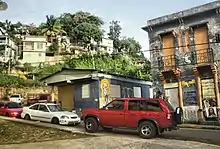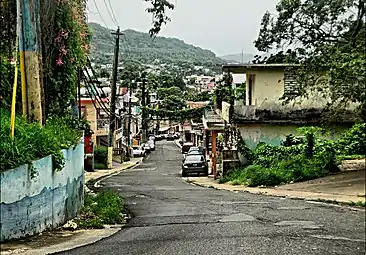Puerto Rico Office for Socioeconomic and Community Development
The Puerto Rico Office for Socioeconomic and Community Development (Spanish: Oficina para el Desarrollo Socioeconómico y Comunitario de Puerto Rico (ODSEC)) is a government agency of Puerto Rico that manages projects to improve and develop "Special Communities of Puerto Rico", (Spanish: Comunidades Especiales de Puerto Rico). The agency works with other government agencies, as well as with community members, to improve the infrastructure of marginalized ("special") communities. Its original founding was in 2001 with Law 1-2001 passed by, then governor, Sila María Calderón.[2] The new entity, employing some of the same people it had under a preceding office, is now responsible for "administering disaster funding". In April 2019, the HUD reported five concerns regarding the ODSEC's ability to fulfill its duties and responsibilities.
| Oficina para el Desarrollo Socioeconómico y Comunitario de Puerto Rico (ODSEC) | |
| Office overview | |
|---|---|
| Formed | February 9, 2017 |
| Preceding agencies |
|
| Headquarters | San Juan, Puerto Rico |
| Employees | 62 |
| Office executive |
|
OFSA

Law 1-2001, passed on March 1, 2001 created the Oficina del Coordinador General para el Financiamiento Social y la Autogestión (OFSA), with a mission to eradicate poverty in Puerto Rico. With it, "Special Communities" (Comunidades Especiales de Puerto Rico) across Puerto Rico were to be identified and then residents' voices were to be included in the plans for how to improve same. Community members were to become leaders who would spearhead needed socioeconomic changes within their communities.[3]
Special Communities

Special Communities are a list of 742 places in Puerto Rico which were identified as marginalized and needing attention. Established by Sila María Calderón, the eighth governor of Puerto Rico,[4][5] the idea was to identify and then work to address the high levels of poverty, and lack of resources and opportunities affecting these communities in Puerto Rico. Initially there were 686 places that made the list[6] and by 2008 there were 742 Special Communities.[6] The OFSA agency, as it was then called, believed in solving poverty through a model that involved all community residents, the private sector and government agencies, working together to find solutions to community problems so as to improve quality of life in those communities.[7] In 2016, with a small budget of US$3.761 million, the mission remained the same; to create sustainable development, and empower people to work together on improving infrastructure, housing and the social fabric of their communities.[8]
ODSEC

Despite the Office of Management and Budget (in Spanish, la Oficina de Gerencia y Presupuesto) recommending the repeal of the original law which created the "Special Communities of Puerto Rico",[9] in early 2017, Governor Ricardo Rosselló created the new government agency, ODSEC, to continue the work which had been started with law 1-2001, and to continue the "Special Communities of Puerto Rico" initiative. Jesús Vélez Vargas, its director stated that the program was evolving with more streamlined ways to bring help to these marginalized communities.[10][11] In October 2017, a month after Hurricane Maria devastated Puerto Rico's infrastructure, $41.2 million in federal funds was earmarked for The Puerto Rico Office for Socioeconomic and Community Development (ODSEC) with a mandate that the funds be distributed, for infrastructure work, to municipalities with over 50,000 inhabitants.[2] The new entity, employing some of the same people it had under a preceding office, is now responsible for "administering disaster funding". In April 2019, the HUD reported five concerns regarding the ODSEC's ability to fulfill its duties and responsibilities.[1]
Projects
In 2019, Puerto Rico Department of Transportation and Public Works (DTOP) and Puerto Rico Department of Housing projects had been funded for Special Communities in Barceloneta, Loíza, Hormigueros, and Humacao.[12]
In June 2019, Ricardo Rosello announced that $2 million had been appropriated to the ODSEC for construction of new roofs. The total number of homes that could receive new roofs was 180, of the 20,000 to 30,000 homes still missing roofs since Hurricane Maria hit Puerto Rico on September 20, 2017.[13]
See also
References
- "HUD Inspector Assesses Puerto Rico's Proposed CDBG-DR Agency". National Low Income Housing Coalition.
- "Puerto Rico granted federal community development funds after hurricane". Caribbean Business. 16 October 2017. Retrieved 28 June 2019.
- Fuller Marvel, Lucilla (April 29, 2015). "Planificación Integral y Justa" (in Spanish). Fundación Puertorriqueña de las Humanidades (FPH).
- Rivera Quintero, Marcia (2014), El vuelo de la esperanza : Proyecto de las Comunidades Especiales Puerto Rico, 1997-2004 (Primera edición ed.), San Juan, Puerto Rico Fundación Sila M. Calderón, ISBN 978-0-9820806-1-0
- "Leyes del 2001". Lex Juris Puerto Rico (in Spanish). Retrieved 24 June 2019.
- "Comunidades Especiales de Puerto Rico" (in Spanish). 8 August 2011. Retrieved 24 June 2019.
- "Agencias_Convocatorias - Oficina del Coordinador General para el Financiamiento..." www.pr.gov. Retrieved 28 June 2019.
- "Agencia: Oficina del Coordinador General para el Financiamiento Socioeconómico y la Autogestión (Proposed 2016 Budget)". Puerto Rico Budgets (in Spanish). Retrieved 28 June 2019.
- "OGP recomienda derogar Ley de Comunidades Especiales" (in Spanish). MicroJuris. 26 January 2017. Retrieved 28 June 2019.
- "Evoluciona el proyecto de Comunidades Especiales". El Nuevo Dia (in Spanish). 24 February 2017. Retrieved 24 June 2019.
- "Ya es ley Oficina para el Desarrollo Socioeconómico y Comunitario". El Vocero de Puerto Rico (in Spanish). Retrieved 24 June 2019.
- "Comunidades Especiales". Autoridad para el Financiamento de la Infraestructura de Puerto Rico (in Spanish). Retrieved 28 June 2019.
- Todavía quedan sobre 20,000 casas con toldo: El gobernador Ricardo Rosselló anuncia iniciativa para poner techos a 180 (1%) de estas viviendas. Ricardo Cortés Chico. El Nuevo Dia. (Guaynabo, Puerto Rico) 3 July 2019. Accessed 6 August 2019.